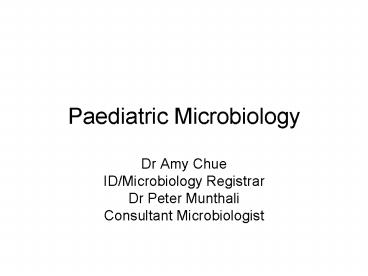Paediatric Microbiology - PowerPoint PPT Presentation
1 / 27
Title: Paediatric Microbiology
1
Paediatric Microbiology
- Dr Amy Chue
- ID/Microbiology Registrar
- Dr Peter Munthali
- Consultant Microbiologist
2
Objectives
- By the end of this session you should be able to
- Distinguish between the common causes of
infections in the neonate and older children - Relate maternal infections to neonates
- Interpret CSF findings in relation to clinical
presentation in neonates - Demonstrate rational use of antibiotics in
neonatal sepsis with regard to possible causative
organisms
3
Case One
- 3 week old baby born at 39/40
- Normal vaginal delivery
- Healthy and feeding well initially
- Upset and crying
- Bulging fontanelle noted by parents
- Taken to ED
- Hx admitted a week earlier with bronchiolitis
and discharged with no antibiotic treatment
4
Results
- CSF
- Clear and colourless
- RBC 84x106/L
- WCC 236x106/L
- Gram stain organisms not seen
- Glucose 3.1 mmol/L
- Protein 1.4 g/L (0.15 0.45)
- FBC
- Hb 101g/L (111 141g/L)
- WCC 24.85 x 109/L (6 18.0 x 109/L)
- CRP 46mg/L (lt11mg/L)
5
Questions
- What is the possible microbiological diagnosis?
- What antibiotics would you consider commencing
and why?
6
(No Transcript)
7
Microbiology
8
Management
- Amoxicillin based regime for 14 days
- Vaccination (2/12, 4/12, 12/12)
9
Case Two
- 1 day old baby born at 365
- Floppy at birth
- Mother had fever during labour and received some
antibiotics - Baby started on Cefotaxime and Amoxicillin
10
Investigations
- LP
- Gram
- Turbid CSF
- RBC 6x106/L
- WCC 1046x106/L 90 Poly
- Glucose 1.9mmol/L
- Protein 1.30g/L (0.15 0.45g/L)
- No organism seen
- CRP 164
- FBC
- HB 93g/l
- WCC 13.09x109/L (6.0 18.0)
- Blood culture Gram positive cocci ?type
11
Questions
- What is the diagnosis?
- What is the possible microbiological diagnosis?
- Is this infection preventable?
- Should antibiotics regime be changed?
- If so, how?
12
Organisms
- Group B Streptococcus
- Streptococcus agalactiae
13
Management
- Penicillin based regime (Benzylpenicillin Vs
Amoxicillin) - Prophylactic antibiotics given during labour
- Cefotaxime as blind treatment for neonate
14
Case Three
- 7 day old baby born at term
- Normal vaginal delivery
- Presents with fever, irritability and poor feeding
15
Investigations
- FBC
- Hb 115g/l
- WCC 24.85x109/L
- CRP 12
- Blood cultures Gram positive bacilli
16
Questions
- What is your microbiological diagnosis?
- How would you manage the case
- Antibiotics
- Infection control
17
Diagnosis
- Listeria monocytogenes
18
Listeria monocytogenes
- Gram positive bacillus
- Pregnant women particularly at risk
- Certain at risk foods
- Inherently resistant to cephalosporins
19
Management
- Amoxicillin for 14 - 21 days
- Infection control isolation
20
Case Four
- Baby born at 38 wks, 2.6Kg
- Mother had episiotomy
- Baby discharged well on day 2
- Readmitted on day 7 with
- Wt loss
- Poor feeding
- Abnormal limb movements
- EEG no seizure activity
21
Investigations
- CRP 158
- CSF
- Cell count normal
- Glucose normal
- Protein 0.85g/L (0.15-0.45g/L)
- Clotting deranged
- Low platelets
- LFTs deranged
- CT extensive bleeding on brain and evidence of
hypoxic injuries
22
Treatment
- Initial treatment Benzylpenicillin and
Gentamicin - Modified treatment Meropenem and Vancomycin
23
Further investigations and treatment
- What further investigations should be done
- On CSF
- On Blood
- What is the possible diagnosis?
- Is the current antibiotic regime adequate?
24
Further Results
- CSF PCR HSV 1 positive
- Blood PCR HSV 1 positive
25
HSV infection in neonates
- Usually peri natal and post natal
- 45 skin, eyes and mouth infections
- 20 CNS infection
- 25 disseminated HSV
- Symptoms
- Irritability
- Seizures
- Respiratory distress
- Jaundice
- Coagulopathy
- Pneumonitis
26
HSV in neonates
- Rx high dose aciclovir
- Rx women with lesions
- Suppressive therapy
- Consideration of C-section
- BASHH guidelines
27
Key points
- Possible organisms causing neonatal sepsis
- Group B Streptococcus
- Group A Streptococcus
- E.coli
- Listeria monocytogenes
- Antibiotic treatment
- If Listeria is suspected, must consider
penicillin based regime - Important to consider maternal infection































